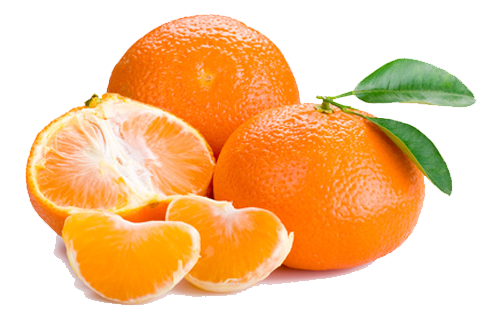|
As in oranges, Tangerines are very low (53 calories/100 g) in calories. Nevertheless, they are valuable sources of flavonoid anti-oxidants like naringenin, naringin, hesperetin, vitamin A, carotenes, xanthins and luteins; in fact, several times higher than in the oranges.
In addition, the citrus fruits are very rich sources of vitamin-C (ascorbic acid), a water-soluble vitamin. Vitamin-C is one of the powerful natural anti-oxidant, which has many essential roles like collagen synthesis, wound healing, anti-viral, anti-cancer activity, and help prevent from neuro-degenerative diseases, arthritis, and cold/fever...etc., by removing oxidant-free radicals from the body. Vitamin C helps absorb iron in the food
by reducing
ferrous form of the iron elements to ferric form in the gut.
Further, they contain natural soluble and insoluble fiber like hemi-cellulose, pectin...etc., which prevents cholesterol absorption in the gut. Adequate fiber in the food aids in smooth bowel movements by acting as a laxative.
Citrus fruits, as such, have long been valued for their wholesome nutritious and antioxidant properties. It is scientifically established that citrus fruits, especially oranges, by virtue of their richness in vitamins and minerals, have many proven health benefits. Moreover, it is now beginning to be appreciated that the other biologically active, non-nutrient compounds found in citrus fruits such as phyto-chemical antioxidants; soluble
and insoluble
dietary fibers play a vital role in reduction in the risk for cancers, many chronic diseases like arthritis, and from obesity and coronary heart diseases.
Healthy skin: tangerines are really good for skin owing to the presence of
significant amount of vitamin C. Scientific studies have validated the role of
Vitamin C in the synthesis of collagen, a structural component vital for the
maintenance of healthy skin. Antioxidant properties of vitamin C present in tangerines
helps in protecting the skin against the damage induced by UV radiations and
helps in revitalizing the aging skin. Furthermore, it aids in reducing the
formation of wrinkles, supports in repairing the damaged skin and assists in
keeping the skin healthy and youthful.
Good for brain: As a source of natural folate, eating a few tangerines regularly
may prove helpful in the normal functioning of brain and support in reducing
stress and depression. Folate content present in tangerines may even prove
valuable during pregnancy especially for the unborn babies by protecting them
against the neural tube defects.
Immune booster: Consumption of citrus fruits such as tangerines helps in
enhancing the disease fighting ability of the body and strengthens the
immunity. Strong immune system aids in preventing the occurrence of a range of
infections and helps reducing the severity of fatal diseases. This attributes
to the abundance of vitamin C and other phytonutrients in tangerines which
provides tangerines protection against the damaging action of the oxygen free
radicals produced during energy metabolism.
Strong bones and muscles: Eating juicy tangerines
may also contribute in keeping your
bones strong and healthy attributing to the presence of the calcium and
phosphorous content. These minerals are important for all age groups and also
play an important role in the muscle contraction.
Digestive health: tangerines are a good source of fibre which adds bulk to your
stool and facilitates better digestion and keeps constipation at bay. Fibre
content present in clementine also aids in better absorption of nutrients from
the food by slowing down the digestion process. Furthermore, potassium content
present in clementine helps in normalizing muscle contraction and relaxation
which stimulates better movement of food and waste through their respective
routes.
Cardiovascular
health: tangerines are good for heart owing to the presence of potassium
mineral. Consumption of potassium rich tangerines help in normalizing cardiac
arrhythmia or irregular heartbeat and also assist in maintaining healthy levels
of blood pressure and prevents hypertension. It even reduces the risk of fatal
conditions such as stroke.
Electrolyte balance:
tangerines are valuable in maintaining the electrolytic balance
of the body again attributing to the presence of potassium content. Eating potassium rich tangerines aids in
maintaining natural water balance amidst the cells and the body fluids which is
extremely critical for the healthy functioning of the entire system.
Cancer: Inclusion of citrus fruits like tangerines also helps in
fighting various types of cancer. This owes to the presence of anti-cancer
components such as vitamin C and powerful bioactive molecules such as limonoids
and quercetin. Citrus fruits including tangerines also contain pectin which is
another component that helps in protecting the body from developing multiple
cancers.
Clementine oil for
aromatherapy: Clementine oil is used in aromatherapy owing
to its pain relieving and rejuvenating nature. It possesses purifying
properties and promotes better and restful sleep. Massage with clementine oil
aids in relieving stress, uplifts the mood and enhances mental clarity.
However, people with dry or sensitive skin should be cautious while using
clementine oil and should consider using additional carrier oil during its
topical usage. Essential oils such as clementine oil may also cause photo
toxicity and hence one should refrain from direct exposure to the sunlight for
a few hours post the application of such oils on the skin.
|

